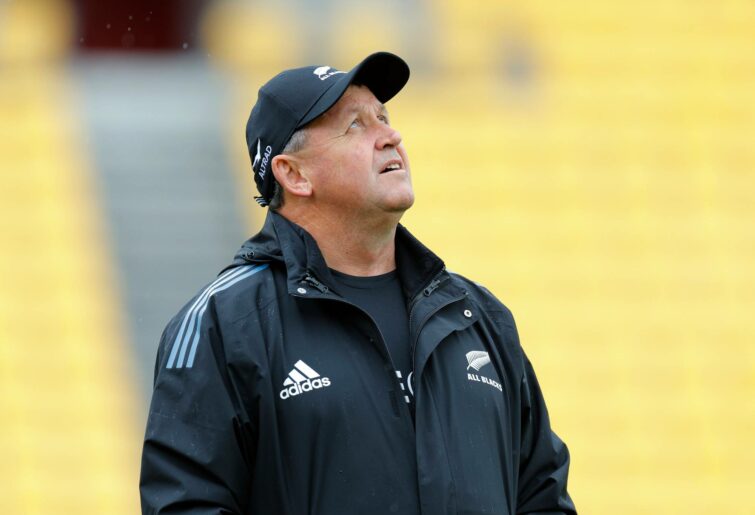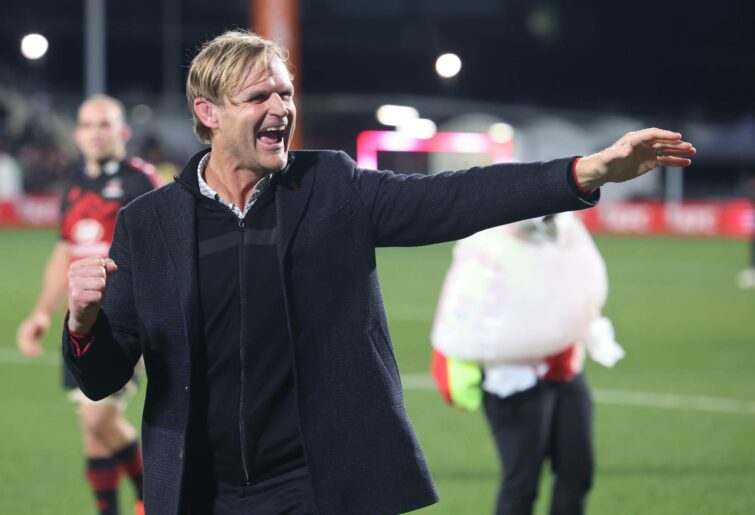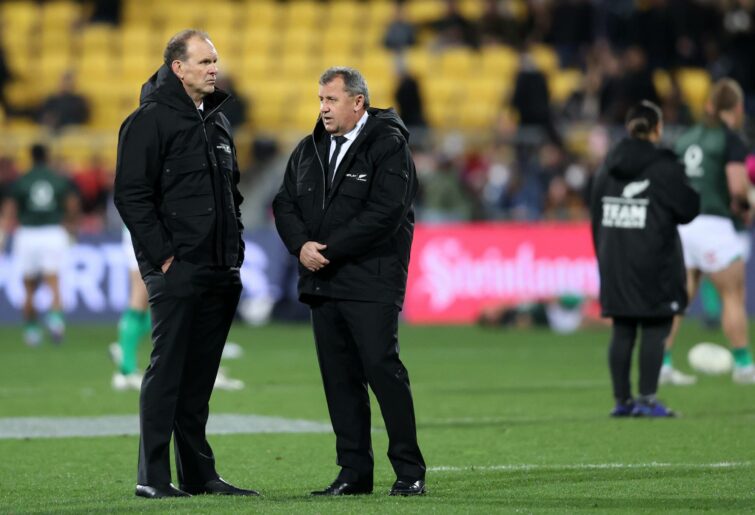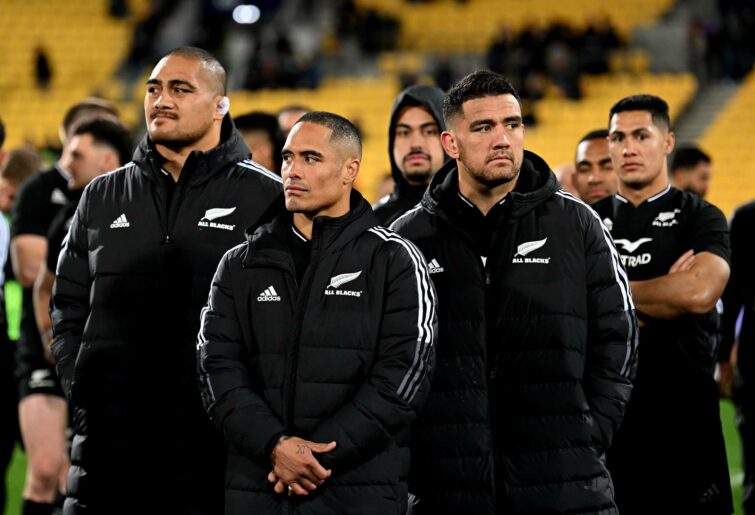It is possible to prefer one person over another without falling into the intellectual inanity of ‘Foster bad, Robertson God, rub tummy, give me wins, much wampum’.
Likewise, the cheap trick of creating a straw man to burn down hardly elevates things; this includes the kind of pseudo-psychological portrait of ‘Foster is a nice guy, but nice guys don’t win’.
So, buckle up and get a fistful of barf bags ready because whilst I am not of the view that Foster can continue in the role I am going to do something that I feel has really been missing and give you some facts for a change in diet.
Ian Foster was born and raised in ‘the Waikato’, as it was known to me. He is the most capped Waikato player, with 148 games as a very capable fly-half, playing in the transitional period between quasi-professionalism and professionalism; 1986-1998.
He played 28 games for the franchise that was the Waikato Chiefs (now Gallagher Chiefs) between 1996-1998.
I have clear recollections of seeing Foster play. He was a solid running fly-half in a provincial set up that has always liked to entertain – there’s horse breeding country there and the players like to run as well. I like a bit more forward grind in my brew, but I never mind watching Waikato and variants rock up.
I never thought ‘All Black’ when I watched Foster play, but I did think that if injuries, domestic disturbance or other scenarios intervened, he wouldn’t have disgraced the jersey.
None of the commentary I have seen on Foster considers his playing days, but it should because it is part of the make-up of the man.
This is a guy who saw a lot of rugby, including at a high level and he has been thinking about the game and analysing play and players for a very long time.
He may not have been an All Black but being the most capped player for your province suggests you could play a bit.
That it was at 10 suggest he may have some grasp of the game.
Ian Foster coached Waikato in the then NPC to first place and second place in 2002 and 2003. He had a solid roster of players, but not more. For the death riders, his sides didn’t win the finals in either year.
In 2004 Ian Foster took over the Super Rugby franchise then called the Waikato Chiefs. In the 3 years before him they had finished 6, 8 and 10 out of 12 sides.
Chiefs’ sides were not sides with great depth at this level and they typically featured a handful of All Blacks; it wasn’t a case of wasting riches, which was arguably the case over at Auckland for many years.
In his first year in charge, Foster took the Chiefs to their first finals appearance (the competition was in its eight season), where they lost away to the Brumbies, who then rolled a fairly handy side in the Crusaders.

Ian Foster (Photo by Hagen Hopkins/Getty Images)
In 2009 Foster led them to their first appearance in a Super final – they were belted, away on the high veldt by a tremendously efficient Bulls side (who had given the Crusaders a relative beating 36-23 in the semi final). In 2010 and 2011 his sides had to deal with significant injury issues and although it is fair to say that is part of rugby I think it has to be allowed in assessing performance.
Ian Foster enjoyed the longest reign as Chiefs head coach (7 years) in a province that had and has had significant turnover of coaches (4 in 7 years before his appointment). His winning ratio was an unexciting 50.7% over his Super Rugby career. He had no Super Rugby trophies to his name.
I don’t think you can discount any of these things. On the plus side there is the fact that his performances were considered strong enough for him to have the longest reign of any Chiefs coach and he racked up two firsts with a modest player roster.
The downside is no trophies and that win-loss ratio. We are talking about the All Blacks, not an also ran side in the international constellation; only the best will do.
But here is a tricky thing – Foster gets the gig with that pesky 50% ratio – no good. Warren Gatland’s Super Rugby record – 28%. John Mitchell (Chief’s coach in 2001) had a 54.5% record. Yet I think you could argue that both made pretty decent test level coaches, whether you like their style, their haircuts or whatever.
Then there is Tony Brown who has a bipolar Super Rugby record with the Highlanders of 37% in 2021 and in 2017 – 68.7%. His coaching ally, Jamie Joseph at the Highlanders between 2011-16 sits on 53.4%, including finishing 8, 9, 14 in his first three years and featuring an infamous loss in 2013, at home, to a Western Force side down to 13 men at the end of the game – yikes.
Let’s not even consider how these two, whom I consider to be very gifted, went with the Sun Wolves – do you remember them? Yet you might say that at least Joseph won a Super Rugby trophy in 2015 and I agree that it is a real achievement.
The thing is that head coaching at Super Rugby and Test level is very different. The style is different the demands are different, the non-pitch commitments are different. I would regard Warren Gatland as a very well qualified candidate for the All Blacks, but his Super Rugby record wouldn’t win him the vote, would it?
I rate Tony Brown and Jamie Joseph very highly but what part of their Super Rugby record do you focus on?
Now, my preference is for Razor Robertson. His record speaks for itself. The odd Super Rugby title and consecutively. An All Black and Crusaders hard man who, in my view, probably deserved more tests. I thought he was very good. But let us also recall a fellow named Wayne Smith.

Crusaders head coach Scott Robertson (Photo by Peter Meecham/Getty Images)
Smith took the then Canterbury Crusaders from a wooden spoon in 1996 under Wayne Stuart to a brace of Super Rugby titles in 1998 and 1999, toppling the seemingly unstoppable Auckland/Auckland Blues dynasty in the process.
He inherited an All Blacks side in transition from a period of true greatness (about 1995-1997) that was also looking for a new style (sound familiar?). He lasted two seasons before terminating his reign. It still makes me feel sad thinking about it, because if ever there was a story of a good man undone, I think it was Wayne Smith.
Yet his Tri-Nations record was 50%, no silverware and in 2001 Australia managed a clean sweep of the two tests, including a historic win at the House of Pain, when it wasn’t under glass and had real character; there were days you could probably have caught a few Bluff oysters blown in by the cyclonic winds and fixed Australia’s droughts by catching just a little of the rain.
Robbie Deans also had enormous success at the Crusaders, but his time at the All Blacks with Mitchell didn’t endear him to the national selectors in 2007 when Graham Henry’s job was on the line; there were mutterings about drinking culture and favouritism in selection and unmanageable coaching staff in the Mitchell-Deans set up and then Robbie sought the job in 2007 with a team of him and ‘to be announced’ as his assistants.
Robbie ended up as ‘Dingo’ Deans and he did a sound job with Australia, but I think it is safe to say that when it turned to mush in 2013 everyone probably felt that the success expected hadn’t quite materialised. Lots of reasons can be offered for that, but there it is, another example of a truly superior Super Rugby record not equating to the same at test level.
Maybe also another example of superior coach meets not so superior player group and player group 1, superior coach 0. That hardly means Razor is destined to fail, or that provincial success means nothing but be careful in assuming that it is somehow obvious Robertson had to be appointed.
What Foster did have is real depth of experience in coaching. Aside from his Waikato and Chiefs experience, he was tapped in 2005 to coach an All Blacks trial side and in 2005-07 and 2009 he coached the Junior All Blacks (the age group varied but now it is the New Zealand Under 20’s, it has been Under 19 and Under 21) with a 100% record. Some others who had the gig with their records – Rob Penney and Chris Boyd each 60%, Scott Robertson 93%, Dave Rennie 100%, Craig Philpott 79%, Russell Hilton-Jones, Chris Anscombe 100%.
Chris Boyd at 60% looks a bit disappointing, but then he did win a Super Rugby trophy with the Hurricanes in 2016, again highlighting that success at one level doesn’t guarantee success at another and vice versa. Foster was also taken on tour with the All Blacks in 2008 to get experience, so he has a long history of a lot of different people thinking he might not be a dope at rugby.
It is also worth dispelling the comment I saw about Foster’s time as Assistant Coach with the All Blacks from 2012-2019 – the comment was that he was a junior member of that group. Well, if junior means being a selector and the back line coach, I guess that is right. Apparently Grant Fox, as he was ‘just a selector’ must have been so junior as to be a janitor. Wayne Smith, who did defence and some skills was perhaps the toilet cleaner?

All Blacks head coach Ian Foster (Photo by Phil Walter/Getty Images)
Also of note is that past and present players have spoken out strongly in support of Foster. If you think elite players will tolerate a blundering duffer to make or break their careers I don’t think you know much about coaching rugby.
The current players might have to hold their tongues, but they don’t have to come out in his favour the way Ardie Savea did.
But former players coached by Foster have also spoken out and they include people with no special reason to hold a Foster brief – Julian Savea was basically moved on by Foster, Fox and Hansen and Mils Muliaina can compare coaches he had at the Blues and the All Blacks with Foster.
It doesn’t make Foster the king of coaches but it does give reason to pause for thought.
There is also the view expressed that Foster was installed in some kind of North Korean like covert operation. Now, I have no problem with the idea that politics and prejudices play a part in any selection process and it is clear that Hansen wanted Foster to replace him.
But ask yourself ‘Why?’ Hansen could walk away without getting involved and thus without risking his reputation.
Rightly, or wrongly, he thought it was worth investing some of his own reputation in backing Foster. If the bloke was such an unqualified, muddling nobody why would you do that?
I am struck by the fact that Graham Henry had no skin in this game. He was a Canterbury and Auckland man and so why would he back a hick from Waikato?
Why would a former Black Ferns netball star on the panel do the same? It is worth noting that the incoming CEO of New Zealand Rugby, Mark Robinson was also on the panel and he was a former teammate of … not Foster but one Razor Robertson.
I read comments that say that Foster was installed in a back room deal but it requires a lot of people, seemingly with no close connection to Foster (and in some cases with provincial history that would lean to Robertson), to come together in a sort of cabal reminiscent of that pizza shop in Washington DC that features in Q Anon.
Was Hilary seen flying into Wellington in late 2019 as the board were meeting?
Critical in assessing Foster is also recognising the context. New Zealand rugby had a historically great side from about 2010-2017.
But the sting in the tail of great sides is that what follows is usually not quite so great. My take is that around late 2018 people really looking hard at New Zealand’s player stocks and the trend in the interpretation of the laws of the game had to make a judgement call.
Could New Zealand compete in tight, forward grind with England, South Africa, France etc. combined with stifling rush defence, or would they need to look for a different way, closer to the strengths that the player group did offer?
The latter would mean a focus on quick ball movement away from contact and emphasising the pace, strength and rugby smarts of the players – all things that New Zealand probably enjoyed in greater amount than any other nation.
After two seasons, by late 2018 it was clear no replacement for Jerome Kaino had been found and this was impacting the time and space around the ruck on both attack and defence. Read was in his twilight without any obvious replacement, which impacted both the ruck and lineout and in turn these two positional weaknesses meant playing a territorial game was no longer a safe thing.
Lock depth was also proving problematic, adding to the issues with playing a territorial game.
The Hansen/Foster take on the best direction for New Zealand rugby will provide a roller coaster, in my view, like the beatings handed out to Ireland in 2019 at the Rugby World Cup and the first test of this year and like that given to South Africa in 2019 and again on the weekend.
However, it will also see the other results. My hope is that a more hard-nosed approach may work better and I think Robertson is the person to do that, but in a time of transition I can’t be sure and I can’t deny the other view is a legitimate case.

A dejected All Blacks (Photo by Joe Allison/Getty Images)
Robertson could go the same way as Wayne Smith, John Hart and Mitchell if the answers at lock, six and eight turn out to be a mirage and I do see some similarities in Robertson and Mitchell in the personality stakes.
As I have never met either of them I won’t push that too far, lest I indulge in the same pop psychology that I have criticised in others.
So, Ian Foster might not be my man, or yours, but unqualified, a duffer who got the gig on the basis of ‘Buggins’ turn’ – I just can’t see that either.
One thing I can feel sure of – he and his group and the players are busting themselves because for them it is a passion and their careers.
For you and me it is, in the end, just a game and so maybe we should be a little more careful, a little more thoughtful and a little less savage in our response to disappointment and frustration; isn’t that what having a cat/dog or child is for?
